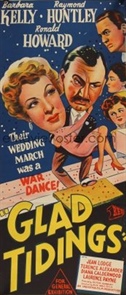| Glad Tidings | |
|---|---|
 | |
| Directed by | Wolf Rilla |
| Written by | Wolf Rilla |
| Based on | play by R. F. Delderfield |
| Produced by | Victor Hanbury John Bremer executive: Nat Cohen Stuart Levy |
| Starring | Barbara Kelly Raymond Huntley Ronald Howard Jean Lodge |
| Cinematography | Eric Cross |
| Edited by | Peter Seabourne |
| Music by | Wolf Rilla |
Production company | |
| Distributed by | Eros Films (UK) |
Release date |
|
Running time | 67 minutes |
| Country | United Kingdom |
| Language | English |
Glad Tidings is a 1953 British second feature ('B') [1] comedy film directed by Wolf Rilla and starring Barbara Kelly, Raymond Huntley and Ronald Howard. [2] [3] It was written by Rilla based on the play of the same title by R. F. Delderfield.